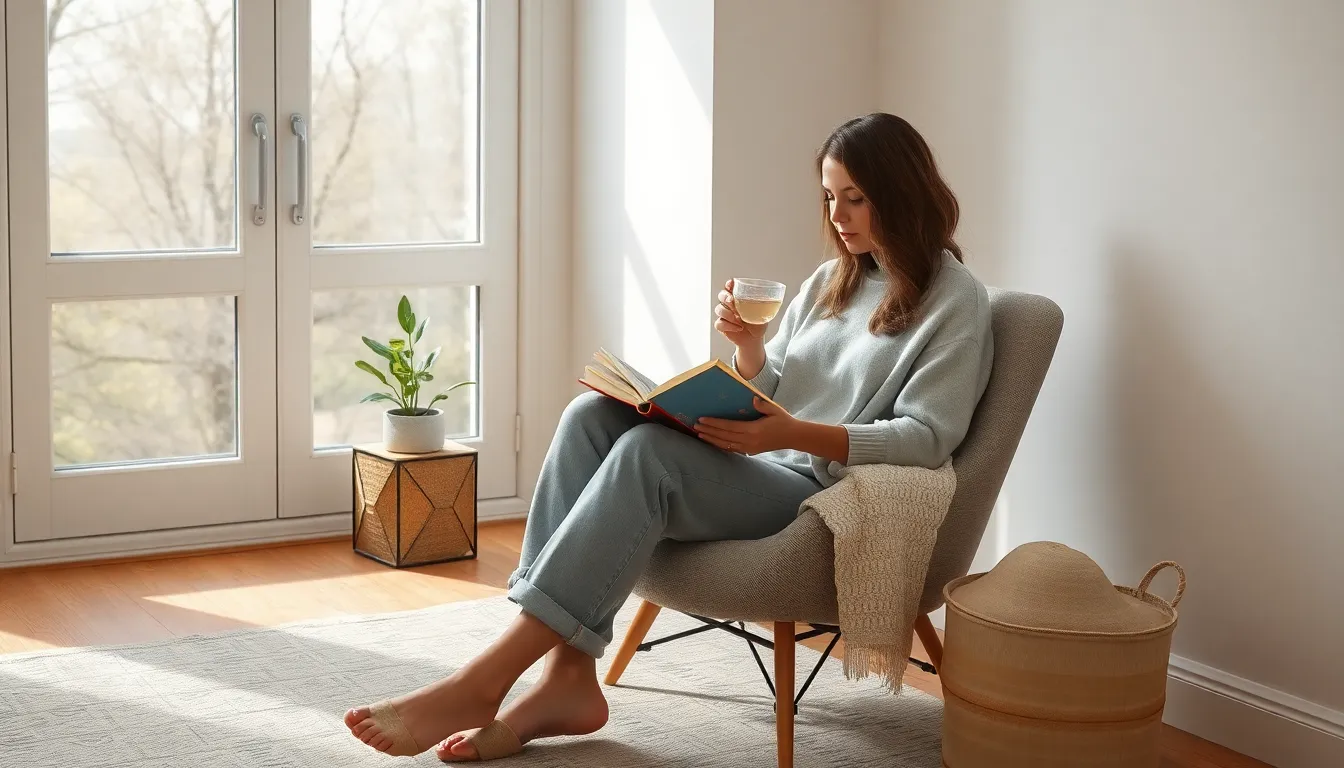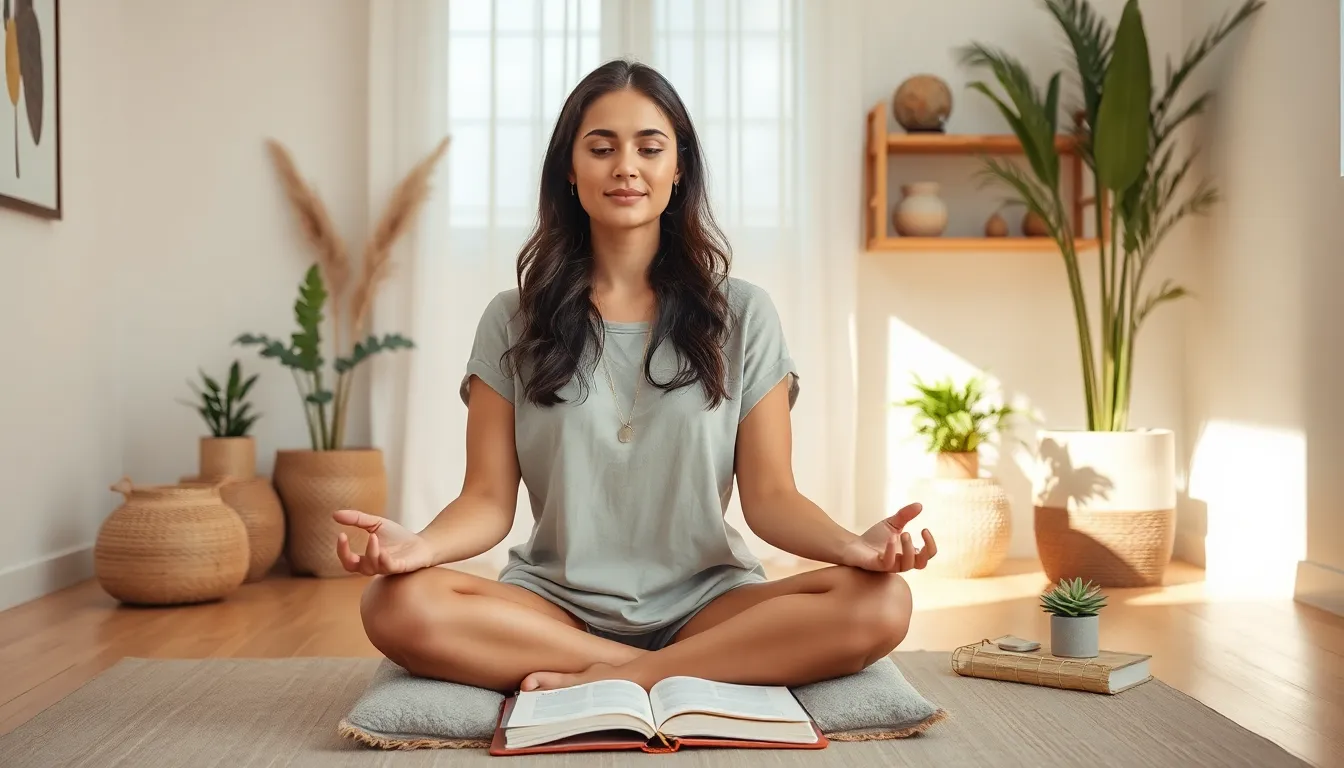In a world overflowing with distractions and demands, the concept of minimalist self-care offers a refreshing approach to well-being. It encourages individuals to strip away the excess and focus on what truly nurtures the mind, body, and spirit. By embracing simplicity, one can cultivate a more meaningful and fulfilling self-care routine that prioritizes quality over quantity.
Minimalist self-care isn’t just about reducing clutter; it’s about finding clarity in a chaotic environment. This lifestyle promotes intentional choices that enhance overall wellness without the overwhelm. From decluttering physical spaces to simplifying daily routines, this approach empowers people to reclaim their time and energy, allowing them to invest in practices that genuinely resonate with their needs.
Table of Contents
ToggleUnderstanding Minimalist Self-Care
Minimalist self-care focuses on simplifying well-being by concentrating on essential practices that nurture the mind, body, and spirit. This approach helps individuals recognize and prioritize what genuinely contributes to their wellness.
Definition and Principles
Minimalist self-care embodies a philosophy that values simplicity and intentionality in personal wellness practices. It involves identifying and eliminating distractions and excess that detract from genuine self-care. Key principles include:
- Intentionality: Make purposeful choices about activities and products used for self-care.
- Simplicity: Embrace straightforward practices that require minimal time and resources.
- Focus: Concentrate on activities that provide the most nourishment, such as meditation or journaling.
- Mindfulness: Engage in self-care practices with full awareness and presence.
- Decluttering: Remove physical and mental clutter to create space for meaningful self-care experiences.
Benefits of Minimalist Self-Care
Engaging in minimalist self-care brings various benefits that enhance overall well-being. These benefits include:
- Improved Clarity: Simplifying choices leads to better decision-making regarding wellness activities.
- Reduced Stress: Focusing on essential practices minimizes feelings of overwhelm from excessive options.
- Enhanced Energy: Decluttering time and space allows individuals to channel energy into fulfilling self-care routines.
- Increased Satisfaction: Prioritizing what truly matters fosters deeper fulfillment and contentment.
- Sustainable Practices: Minimalist self-care encourages long-term habits that contribute to ongoing well-being.
Engaging with minimalist self-care offers a clearer path to personal wellness, aligning daily practices with core values and needs.
Practical Strategies for Minimalist Self-Care

Implementing practical strategies enhances the benefits of minimalist self-care. Focusing on essential practices leads to a more fulfilling and manageable life.
Decluttering Your Routine
Decluttering a routine involves identifying and removing unnecessary tasks and commitments. Prioritize daily activities by evaluating their impact on well-being and happiness. For instance, listing routine tasks can highlight those that drain energy without providing value. Eliminating distractions, such as excessive screen time or unproductive habits, strengthens focus on meaningful activities. Designating specific time blocks for self-care, work, and leisure fosters a balanced schedule. Adopting simplicity in daily planning leads to clearer decision-making.
Choosing Quality Over Quantity
Choosing quality over quantity transforms self-care practices into enriching experiences. Selecting fewer but more impactful activities increases satisfaction. For example, engaging in a single, well-loved hobby often provides more joy than juggling multiple pastimes. Investing in high-quality self-care products, such as skincare or wellness items, enhances effectiveness and contribution to well-being. Establishing deeper connections with a small circle of friends fosters meaningful interactions. Prioritizing quality leads to sustained interest and motivation, making self-care a rewarding aspect of daily life.
Mindfulness and Minimalist Self-Care
Mindfulness complements minimalist self-care by fostering awareness and presence. This approach allows individuals to focus on essential practices that promote well-being and clarity.
Practices to Incorporate
- Meditation: Set aside 10-15 minutes daily for meditation. This practice helps cultivate a calm mind, reduces stress, and improves focus.
- Breathwork: Engage in deep breathing exercises. These can ground individuals and bring attention back to the present moment, enhancing emotional regulation.
- Gratitude Journaling: Write down three things daily that they appreciate. This practice shifts focus to positivity, reinforcing satisfaction with life.
- Digital Detox: Allocate certain hours free from screens. A digital detox aids in reducing distractions, allowing for more thoughtful interactions and activities.
- Mindful Eating: Eat slowly and savor each bite. This practice encourages awareness of food choices, fostering healthier eating habits and enhancing enjoyment.
Creating a Mindful Space
- Declutter the Environment: Remove non-essential items from living areas. A clean, organized space reduces visual distractions and promotes mental clarity.
- Incorporate Natural Elements: Use plants or natural materials in decorating. These elements enhance tranquility and create a calming atmosphere.
- Designate a Quiet Zone: Create a specific area for relaxation and mindfulness practices. This space should be free from noise and distractions, encouraging peace and focus.
- Optimize Lighting: Use soft, warm lighting to create a welcoming environment. Natural light also improves mood and enhances focus.
- Personalize with Intention: Select meaningful decor items. Personal touches foster a sense of connection and encourage a positive mindset.
Minimalist Self-Care Tools
Minimalist self-care tools simplify the process of nurturing well-being. Focusing on essential items and resources strengthens the commitment to a meaningful self-care routine.
Essential Items to Consider
- Quality Journal: A high-quality journal supports reflection, tracking progress, and cultivating gratitude through daily entries.
- Meditation Cushion: A comfortable meditation cushion encourages consistent mindfulness practice, enhancing focus during meditation sessions.
- Herbal Tea: Herbal tea offers calming benefits, serving as a ritual to unwind and promote relaxation.
- Essential Oils: Essential oils provide natural aromatherapy options to elevate mood and foster a tranquil environment.
- Mindful Eating Set: A mindful eating set, including a small plate and chopsticks, encourages intentional eating habits, promoting awareness during meals.
- Decluttering Tools: Bins and storage options assist in decluttering physical spaces, creating a more organized and soothing environment.
Apps and Resources for Support
- Meditation Apps: Popular apps like Headspace or Calm offer guided meditations, fostering mindfulness at any time.
- Habit Tracking Apps: Apps such as Habitica or Streaks help track self-care initiatives and establish consistent habits.
- Digital Journaling Platforms: Platforms like Day One provide digital journaling capabilities, making reflections and gratitude accessible and organized.
- Fitness Videos: Streaming services like YouTube host a range of minimalist fitness routines that can be performed with minimal equipment.
- Mental Health Resources: Websites like BetterHelp offer professional support and counseling, ensuring access to mental health resources when needed.
- Mindfulness Blogs and Podcasts: Blogs and podcasts focused on mindfulness provide insights, tips, and inspiration, helping participants stay connected to their practices.
Embracing minimalist self-care can transform one’s approach to well-being. By focusing on simplicity and intentionality individuals can cultivate a more fulfilling and balanced life. This journey encourages clarity and mindfulness allowing for deeper connections with oneself and others.
Prioritizing essential practices over overwhelming choices leads to reduced stress and increased satisfaction. With practical strategies and tools at their disposal people can create a self-care routine that resonates with their core values. Ultimately minimalist self-care isn’t just about doing less; it’s about doing what matters most.







